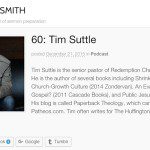This is the sermon I preached last week at my church Redemption Church. If you are a pastor feel free to copy & steal everything.
2014.02.16 – Light will Shine 07
Matthew 5:21-37 – You’ve heard it said but I Say
21 “You have heard that it was said to those of ancient times, ‘You shall not murder’; and ‘whoever murders shall be liable to judgment.’ 22 But I say to you …
Jesus begins this section w/a pedagogical formula used by he scribes when they taught. They’d say, “You’ve heard it said,” & then quote from the Torah or from a famous rabbi. So when JS says, “You’ve heard that it was said,” they were all expecting him to quote another authority. Instead he says, “But I say…” We can’t overstate what a radical move this was. He’s claiming the right to interpret the LAW for people. This just wasn’t done. If you mess w/the law & you mess w/the very identity of Israel.
Really quickly – we’ll use the term LAW a lot today – I just want to make sure we all are thinking of same thing. You can think of the law as 3 concentric circles: Center of law: is shema, Hear oh Israel, the Lord is our God, the Lord alone. You shall love the Lord your God w/all your heart, soul, mind & Strength, and love neighbor as yourself. The next circle: the 10 commandments. These were the heart of the law. Next circle: Torah, the 1st 5 books of Hebrew Bible, which were often called the Law.
JS is offering an innovative way to practice obedience to the LAW & he’s correcting what he sees as a glaring problem w/Pharisees approach. Jesus seemed to think the way the Pharisees follow the law does not transform the person… in fact, it produces a division between the outward & inward life. Jesus leads them toward an UNDIVIDED SELF, in which the outside matches the inside. So he’s constantly pushing his followers to look beneath the surface of their lives, & to consider the SOURCE of their actions. So he starts in w/ “You’ve heard it said, don’t murder…”
22 But I say… if you are angry with a brother or sister, you will be liable to judgment; if you say to a brother or sister, “raca,” you will be liable to the council; and if you say, ‘You fool,’ you will be liable to the hell of fire.
This word angry: orgizo, isn’t about a momentary fit of anger; losing your temper. It’s more like a disposition of anger – smoldering cauldron of anger that lives just beneath the surface of life – defining the person (Vaught/Willard). Even if you never get around to killing, this kind of deep seated anger is just as toxic to your soul & it gets all over everyone else around you. It’ll do the exact same thing to your soul as if you kill someone.
Then he says, “If you say to a brother or sister, “raca,” you will be liable to the council;” … this is kind of interesting: raca is an Aramaic expression meant to be the sound it makes when you clear your throat to spit in someone’s face. It’s a sign of utter contempt.
Then he says, “if you say, ‘You fool,’ you will be liable to the hell of fire.” Greek word here is moros – where we get the word moron. It’s actually the same word used in Ps.14: “the fool says in his heart there is no God.” So it was like saying, “You have no capacity for God… you lack the basic faculties that make us human in the first place.” Again, a move of contempt for another human being.
So in effect Jesus says, “the law says if you murder you’ll be subject to judgment. But I say, if you live in orgizo – a smoldering, toxic, anger and contempt for other people, then you’re working on the same deal.” The problem for us as readers of this text, is that most of us carry around a ready supply of anger & contempt.
I have a theory that most people tend toward either anger / contempt; which is it for you? And this is totally reinforced by our culture… seriously: How many scenes of anger & contempt have you seen acted out over the course of the past year on film or television? Peaceful & serene does not make for good entertainment, right?
So anger & contempt living at the heart of the person will constantly leak out into the world – in scores of conscious & unconscious ways. And when we live out of that broken place of anger & contempt, it’s toxic to the human soul. And it’s enough to poison the whole world. You don’t even need to kill anyone to have the same impact.
Anger & contempt constantly indulged is enough to poison the world. JS is saying it’s not enough to refrain from killing. You need to deal w/the SOURCE of the problem – the chronic anger & contempt. But, the Pharisee’s way of keeping the law – it only cares about that outward behavior… “You kill anyone? No? Okay, you’re good.” … it turns out to just be a way of avoiding having to keep the command; appearing to keep it while violating it constantly. “As long as I don’t kill anyone, then I can think whatever I want about them.” … that’s what Jesus is confronting.
Remember Jesus thinks the point of the law is to shape them into a peculiar kind of people – distinct people… to form their character so that when people looked at Israel, they’d see the image of God. And it won’t happen w/bar set at “don’t kill anyone” …only focused on outward behavior & not the SOURCE. That’ll just give you a bunch of people whose inside doesn’t match the outside.
This is behind Jesus’s teaching that you can’t just clean the outside of the cup. You have to clean the inside first, then outside will just follow along naturally.
Remember the Bernie Madoff scandal? This guy was widely known as an amazing philanthropist, on boards of non-profits, big donor… $6 million for lymphoma research here… $19 million for Bone Marrow Foundation there… all the while committing largest financial fraud in U.S. history. Somewhere around 19 billion dollars he took from people. The outside of the Bernie Madoff cup looked great. But this guy spent 3 decades stealing almost $20 billion. His selfish choice then seeps out into the world & poisons it. I mean, the stories of the people Madoff ripped off, especially retirees – they’re heartbreaking. You can’t just clean the outside of the cup.
Another way Jesus talked about this reality is he said you can always tell a tree by its fruit – Apple trees don’t grow oranges. A heart filled with anger & contempt doesn’t grow roses, right? And there’s no way to fake this – not for any length of time. A person’s actions – eventually – will usually tell you everything you need to know about their heart. We can try to fake it for awhile, but the fruit always outs the tree… you know?
Now you can’t go to the other extreme & say that the actions don’t matter at all. It only matters what’s in your heart…That won’t work either. For example, if you get pulled over for doing 80 in a 55 & you say: “Well, it’s not that big of a deal, I was doing 55 in my heart.” How’s that going to go over?
Jesus is constantly trying to get them to see the potential of the undivided self; the joy of becoming wholehearted people. And it starts when the interior life becomes transformed by the love of God & then the actions begin to grow out of that transformed life. So if the interior life is transformed, then we won’t have to worry about keeping the law. We will have become the kind of people from whom the works of the law will naturally flow.
In fact, the way JS talks about outcomes is fascinating. He says: In case of murder & anger: you’ll be liable to judgment. If you say ‘raca’ & spit in someone’s face: liable to the council. If you say “you fool” you are liable to “the hell of fire.” Now, he’s not giving us a literal sentencing guide for prison terms: this offense means you judgment, this offense gets you called before the council, this one gets you sent to hell. He’s saying this anger, spitting in the face of people, the contempt – it will put you on a trajectory like an escalating crescendo of death, and before you know it: you’re cut off from yourself (you don’t even know who you are anymore), you’re cut off from your community (they can’t trust you), and finally you cut yourself off from God – which is hell. And it all starts w/this bifurcation of the inner life & outer life. This is exactly what Jesus is warning about.
So in equating something like murder w/things like anger & contempt, he’s not saying “If you lose your temper you’re a murderer.” He’s saying these are all part of the same thing that’s killing you & the world. He’s saying that a murder might kill someone immediately. This other stuff kills you & everyone around you – just more slowly. Jesus’s beef w/the Pharisees was that they were missing this reality. All they could think about is the outside of the cup.
Jesus is teaching that unless we deal w/the SOURCE of our brokenness, that brokenness will continue to manifest itself in other ways – it’ll leak out into our lives & poison our relationships & all the things we care about & eventually it’ll poison the world. But you deal with the SOURCE & you’ll have no trouble keeping the law.
So, then Jesus makes a really interesting move. Verse 23, he says: “23 Therefore, when you are offering your gift at the altar, if you remember that your brother or sister has something against you, 24 leave your gift there before the altar and go; first be reconciled to your brother or sister, and then come and offer your gift. 25 Come to terms quickly with your accuser while you are on the way to court with him, or your accuser may hand you over to the judge, and the judge to the guard, and you will be thrown into prison. 26 Truly I tell you, you will never get out until you have paid the last penny.”
So, if you live out of this smoldering cauldron of anger. After you’ve spit in someone’s face. After you called another person a fool. Then you come to the place of worship, and you want to make things right between you & God? Jesus says, it’s never… going… to happen. You want to make things right w/God? He says: Drop the sacrifice & go make things right w/your neighbor. Unless you can somehow reconcile yourself w/those people. There’s no way you can reconcile with God…
So here in the first “you’ve heard it said but I say” Jesus sets the basic program he’ll follow for the rest of this chapter in Matthew… constantly trying to unify the heart & life, constantly pointing us toward an undivided self, constantly warning, that if we don’t address the SOURCE of the behavior, the behavior will persist. And a rotten source doesn’t have to always end in murder for it to be toxic to our own souls, and for our lives to poison the world around us.
Glen Stassen, professor at Fuller Seminary, says that Jesus establishes a rhythm here in this first “You’ve heard it said, but I say.” He presents:
– Conventional wisdom: a normative teaching (shall not murder)
– Mechanism of Bondage: way CW is a trap. (it ≠ deal w/source)
– Transforming Initiative: JS offers way out (be reconciled)
As you look at these three Jesus is helping people see how the Conventional Wisdom, that normative teaching of the law ends up being a Mechanism of Bondage. Then he offers a Transforming Initiative, a way out of the trap that is usually a coming together of the interior & exterior life.
27 “You have heard that it was said, ‘You shall not commit adultery.’ 28 But I say to you that everyone who looks at a woman with lust has already committed adultery with her in his heart. 29 If your right eye causes you to sin, tear it out and throw it away; it is better for you to lose one of your members than for your whole body to be thrown into hell. 30 And if your right hand causes you to sin, cut it off and throw it away; it is better for you to lose one of your members than for your whole body to go into hell.
So this is a lovely little light-hearted section here in the heart of the Sermon. We typically think adultery is cut & dried right? You did or you didn’t. But JS says that to “look at” a woman w/lust is problematic. At which point every male in the church avoids eye contact with me…
The word “look at” is blepo, it means “to catch a glimpse out of the corner of the eye.” Just a little glance… so what’s he doing with this teaching?
Well for one thing the Pharisees were somewhat obsessed w/adultery. In Jesus’s day: actually a Jewish sect called the Bleeding Pharisees. They got their name because they were so worried about adultery that they wore blindfolds everywhere they went. So they’d stumble & fall & were constantly bleeding. Adultery was considered a capital offense – could be killed for it. Many were uncomfortable w/the harsh approach to it. But the Pharisees loved to catch adulterers & punish them.
So, Jesus sort of leans on this whole situation; he says even a little blepo – just a little peek out of the corner of the blindfold is enough to get your mind going down the road of the fantasy. He’s basically saying the fantasy is enough to change the heart. Which is why this isn’t just about men, it’s about all of us, and why it’s not just about adultery, but about any infidelity.
It is sort of funny when you talk about this verse, men always get a little squirmy; but to me the women always seem just a little bit smug about it. Men get squirmy because we know this is our struggle. Men are just so visually stimulated – Jesus’s teaching hits us where we live and we know it. But, women have their own form of a fantasy life that’s just as toxic: the man who seems to be a better husband; he’s more strong or successful or sensitive than your husband; it may not be sexual, but it’s a fantasy just the same.
Jesus moves against this. From his teaching we can learn that you can’t live this inward life that lusts after a fantasy, because it fragments your consciousness. It divides your interior life from your exterior life, and eventually it will leak out into your behaviors and relationships, usually in the form of anger, frustration, lack of intimacy, isolation, or outright infidelity.”
This is the killer part of pornography; as that inner fantasy life grows, the ability to maintain any kind of intimacy dies off. Or, if the fantasy is the man at work… or your best friend’s husband who is so perfect, your husband will never measure up (even though it’s not real it seems real).
And it’s not just with sex it can be anything. As a pastor I see this a lot w/people’s approach to church. People who had a great church experience when they were in their twenties. They forget that they had 2 incomes & no kids, and so did all their friends. With all of that time and money and freedom, and relationships… course it was awesome! Then they grow up & have kids & tougher responsibilities, and then they come to my church… Geeze… NO church can live up to that fantasy…
The fantasy is unfair because it can pretend to be perfect. You never have to see the mistress stumble to the toilet & throw up; hair & makeup perfect. It’s how you know it isn’t real, there are no imperfections.
I try to warn married people as often as I can, that if they are having a fantasy about some other person besides their spouse… just once, have the fantasy all the way through. After the sexual fantasy – go to the next scene, the one where you get caught & break your spouse’s heart. Go to the scene where you are moving your stuff out of your house while the kids are sobbing, “Daddy don’t go!” You know? If you want to have the fantasy, then have the fantasy all the way through.
Which is what Jesus is trying to show us; it’s not about whether or not you are committing adultery. It’s about being present in our own lives – to the people who are counting on us! If we are sucked into a fantasy life, even thought it’s not real in the beginning, it will become real in one way or another. The SOURCE of the outward behavior lies in the interior life. So:
Conventional wisdom: don’t commit adultery;
Mechanism of Bondage: what about adultery of the heart that kills intimacy?
Transforming Initiative: What’s his way out?
“If your right eye causes you to sin, tear it out… better for you to lose one of your members than for your whole body to be thrown into hell…. If your right hand causes you to sin, cut it off… better to lose a hand than your whole body.”
So what is this all about? Well, I don’t think Jesus is recommending self mutilation. In fact his trajectory is he’s moving against fragmentation. The way the language works here, he’s saying, “Better to lose pieces of our life we are attached to that are killing us – than to let them take us down.” He’s not saying gouge out your eye or cut of your hand literally. He’s saying deal w/SOURCE of the fragmented consciousness.
This is probably why he uses “right” eye and “right” hand. The difference between saying “hand” and “right hand” in their world was huge. The right hand was the preferred hand; ritually clean according to the law. The left hand was reserved for unclean tasks (t.p.). Jesus is saying, “You are going to have to leave behind your normal routine, the way you’ve been doing things in order to deal w/the source of your fragmented life, in order for the outside to match the inside & have it be whole & good.”
Then he quickly moves on to the teaching on divorce, which is the first one of these that is NOT one of 10 commandments. 31 “You have heard it said, ‘Whoever divorces his wife, let him give her a certificate of divorce.’ 32 But I say to you that anyone who divorces his wife, except on the ground of unchastity, causes her to commit adultery; & whoever marries a divorced woman commits adultery.
Conventional Wisdom: In JS’s day women couldn’t sue for divorce at all. But men could divorce their wife at any time, for any reason… it was as easy as writing a note: bad hair do? Put on a lbs? Write her a pink slip. It was completely unfair & unjust. And so Jesus moves against that.
Mechanism of Bondage: is, power should never be that concentrated on one side, it will always result in injustice. When one side has all the power, they can too easily push the problems to the periphery – away from them & call it good. It should never be that easy to discard another human being. Wives who were divorced by their husbands had very few options. They could possibly live with a family member – like a servant. She could remarry, but would be considered “damaged goods.” This would probably mean she’s stepping into another degrading relationship. If neither of those panned out, she could end up being a concubine or prostitute. That’s why she needed the note – with a note she couldn’t be stoned for adultery.
Transforming Initiative: Jesus says, face up to your responsibility. You want to send your wife off? Then you are the cause of the adultery here. You can’t imagine what a revolutionary teaching this was. Jesus was telling bunch of men who have had this right for centuries, that if you are the cause for the split, it’s on you. And the implication is, your responsibility goes far beyond just giving her a note. Your responsibility is to stick around and work it out. Live in mutuality and love.
Now, we can’t use this passage to classifying divorce as an irredeemable act of wickedness… sometimes divorce is the proper and right thing. But we always have to tell the truth about the pain it will cause. And we can’t export that pain to the woman & call it good. We cannot let one side have all the power.
Okay, last passage: 33 “…You have heard that it was said to those of ancient times, ‘You shall not swear falsely, but carry out the vows you have made to the Lord.’ 34 But I say to you, Do not swear at all, either by heaven, for it is the throne of God, 35 or by the earth, for it is his footstool, or by Jerusalem, for it is the city of the great King. 36 And do not swear by your head, for you cannot make one hair white or black. 37 Let your word be ‘Yes, Yes’ or ‘No, No’; anything more than this comes from the evil one.
Conventional Wisdom: So in the Torah, there were three main verses about swearing or taking oaths or vows… one in Lev. Num. & Deut. The first two said don’t swear falsely – if you swear to something, do it. But the third one gives some wiggle room. What happened was that people started played games w/binding & non-binding oaths & this was really childish stuff – like when kids say “You promised,” & the other says, “I had my finger’s crossed.” It was silliness, that unfortunately had real consequences. Because nobody wanted to trust these folks anymore. And even worse, playing games with an oath cast doubt on the name of that authority to which they had appealed. So basically, God was being implicated in their schemes.
Mechanism of Bondage: When your oaths multiply & you guys play games with them, your word means less & less & less. It’s like when you buy a house & you go to close. What is it, like 50 signatures? Each signature feels less & less like a significant thing. When you have to pinky swear on everything, it becomes just more evidence that nobody has any integrity. And eventually this lack of integrity seeps out into society.
I heard a story about an American visiting a museum in Japan; they said he couldn’t take a camera inside. His host told him to just leave his camera unattended on the sidewalk – nobody will take it. An hour later, he’s on the 3rd floor of the museum, looking down on the sidewalk, and there is his camera, still sitting where he left it… try that in NYC, right? And so in the U.S., we have 281 lawyers for every 100k people. While in Japan it’s 11. We have to have that many lawyers & judges so they can force us to uphold our word because our word no longer means anything.
Transforming Initiative: let your yes be yes & your no be no. Again, let the interior life match up to the exterior life. Don’t be duplicitous… say what you mean… Do what you say you’ll do… Don’t play games & scheme or cheat to get ahead…
Conclusion: Okay so what do we do with Jesus’s teaching here? How do we avoid the mistake of the Pharisees? Too many of us are confused about this. We’re raised to think Christianity is about knowing right things; or doing the right things. Jesus is pointing past knowing & doing & trying to help us see that the faith of Jesus is all about BEING. Jesus really wants us to transform from the inside out.
The problem is that we have these mechanisms of bondage that keep us from seeing who we really are, and what we are really doing in our own lives. JS is offering a way out… a way to really transform. When we start to make these messes in our lives: the anger rears it’s ugly head. We feel contempt & the arrogance & vanity that goes along w/it; when we start in on another escapist fantasy – the lover we long for or the perfect husband who meets all our needs – when we play games of power – exporting all of the pain to other people – especially the weak or a spouse; when we play games w/our word in order to manipulate other people… play power/control games… Jesus is saying that at some point we have to learn how to track it back to the SOURCE.
“You’ve heard it said” – description of the world that is. “But I say…” – and gives his vision for the world that can be. Jesus’s invitation to that world is an invitation to transform; to get past the outward surface of life, and to begin to deal with the SOURCE of our problems. It’s going to take a lot of courage, and the willingness to listen & hear Jesus speak to us about our lives…
PRAY: As we pray, I invite you to listen to this paraphrase… listen for God’s word to you:
Jesus sits there on the mountain teaching, & he says:
You’ve heard it said, don’t murder; but I say: don’t let anger & contempt be the foundation of your life. Don’t wash the outside of the cup… got to clean the inside first.
You’ve heard it said, don’t commit adultery; but I say: don’t live in a fantasy, it fragments your consciousness & it will end up ruining our relationships. You have to cut the fantasy off. Don’t live out of that fake world, live in the real world.
You’ve heard it said, divorce is as easy as writing a note; but I say: if you play that game it’s on you – you may have the power to do what you are doing, but that doesn’t make it right. Don’t discard a human being like they are nothing. Stick around & live in mutuality & love.
You’ve heard it said, don’t swear falsely… but I say: don’t swear at all – just let your yes be yes, & no be no. The more you swear, the less your word means. Just say what you mean & then live up to it.
God grant us the courage to let these words shape and form our lives. Amen.
















